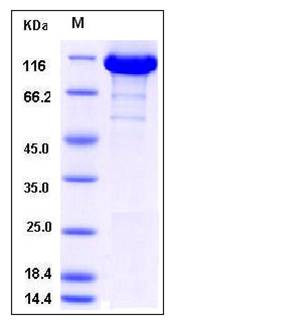Human ACLY / acly / ATP citrate lyase Protein (His Tag)
ACL,ATPCL,CLATP
- 100ug (NPP1860) Please inquiry
| Catalog Number | P11769-H07B |
|---|---|
| Organism Species | Human |
| Host | Baculovirus-Insect Cells |
| Synonyms | ACL,ATPCL,CLATP |
| Molecular Weight | The recombinant human ACLY consists of 1120 amino acids and has a calculated molecular mass of 123 kDa. It migrates as an approximately 110 kDa band in SDS-PAGE under reducing conditions. |
| predicted N | Met |
| SDS-PAGE |  |
| Purity | > 90 % as determined by SDS-PAGE |
| Protein Construction | A DNA sequence encoding the human ACLY (P53396) (Met 1-Met 1101) was expressed, with a polyhistidine tag at the N-terminus. |
| Bio-activity | |
| Research Area | Developmental Biology |Metabolism |Pathways and Processes |Metabolic signaling pathways |Lipid and lipoprotein metabolism |Lipid metabolism | |
| Formulation | Lyophilized from sterile 20mM Tris, 500mM NaCl, pH 8.0, 10% gly 1. Normally 5 % - 8 % trehalose and mannitol are added as protectants before lyophilization. Specific concentrations are included in the hardcopy of COA. |
| Background | ATP citrate lyase, also known as Acly or Acl, is the primary enzyme responsible for the synthesis of cytosolic acetyl-CoA in many tissues. The enzyme is composed of two polymer chains which are polypeptides in human. ATP citrate lyase is responsible for catalyzing the conversion of citrate and CoA into acetyl-CoA and oxaloacetate, along with the hydrolysis of ATP. A definitive role for ATP citrate lyase in tumorigenesis has emerged from ATP citrate lyase RNAi and chemical inhibitor studies, showing that ATP citrate lyase inhibition limits tumor cell proliferation and survival and induces differentiation in vitro. In vivo, it reduces tumor growth leading to a cytostatic effect and induces differentiation. |
| Reference |
